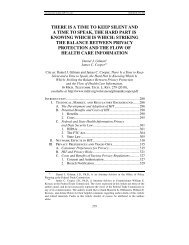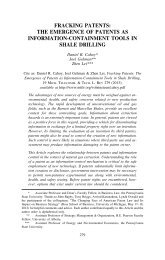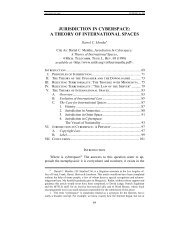the chinese regulatory licensing regime for pharmaceutical products
the chinese regulatory licensing regime for pharmaceutical products
the chinese regulatory licensing regime for pharmaceutical products
You also want an ePaper? Increase the reach of your titles
YUMPU automatically turns print PDFs into web optimized ePapers that Google loves.
432 Michigan Telecommunications and Technology Law Review [Vol. 15:417<br />
standards. Two reasons may exist <strong>for</strong> this: (1)over-<strong>the</strong>-counter drugs<br />
pose no significant side effects or toxicities; 87 and (2)even under <strong>the</strong> <strong>licensing</strong><br />
<strong>regime</strong>, opportunistic advertisers can easily advertise <strong>the</strong>ir drugs<br />
without a license or revise <strong>the</strong> approved version of <strong>the</strong> advertisement in<br />
<strong>the</strong>ir favor. 88 However, an ex ante <strong>licensing</strong> <strong>regime</strong> may incur greater<br />
costs than ex post standards by limiting competition and hindering consumers’<br />
access to <strong>the</strong> most appropriate <strong>the</strong>rapy. 89<br />
4. Licensing of Imported Drugs<br />
For <strong>the</strong> same reasons that new drugs are licensed, checking <strong>the</strong> quality,<br />
safety, and efficacy of imported drugs be<strong>for</strong>e <strong>the</strong>y enter <strong>the</strong> Chinese<br />
market makes logical sense. The argument <strong>for</strong> <strong>licensing</strong> imported drugs<br />
is fur<strong>the</strong>r supported by <strong>the</strong> fact that <strong>the</strong> SFDA has difficulty in en<strong>for</strong>cing<br />
ex post <strong>regulatory</strong> controls against <strong>for</strong>eign manufacturers outside its jurisdiction.<br />
III. Licensing Standards<br />
Licensing standards refer to those conditions <strong>for</strong> compliance by any<br />
person conducting <strong>the</strong> licensed business or activity. “Entry standards”<br />
are those conditions that must be met be<strong>for</strong>e conducting <strong>the</strong> business or<br />
activity. O<strong>the</strong>r conditions that require compliance while <strong>the</strong> business or<br />
activity is being conducted are referred to as “ongoing per<strong>for</strong>mance<br />
standards.” Because this Article focuses on <strong>licensing</strong> requirements controlling<br />
market entry, and because entry standards <strong>for</strong> <strong>the</strong> RCID are<br />
almost <strong>the</strong> same as those <strong>for</strong> <strong>the</strong> NDC, this section will only discuss <strong>the</strong><br />
entry standards <strong>for</strong> <strong>the</strong> manufacturer’s license, trader’s license, and<br />
NDC.<br />
A. Entry Standards <strong>for</strong> a Manufacturer’s License<br />
In China, any applicant <strong>for</strong> a manufacturer’s license must meet certain<br />
standards. First, <strong>the</strong> prospective <strong>pharmaceutical</strong> manufacturer must<br />
employ qualified pharmacists, engineers, and skilled workers. 90 It must<br />
also keep appropriate worksites and facilities, as well as a sanitary envi-<br />
87. Currently, only those drugs which have few side effects or toxicities can be classified<br />
as OTC drugs in China. See id. art. 60; SFDA Commentary, supra note 5, art. 60.<br />
88. According to <strong>the</strong> SFDA, from January to August 2006, 91 percent of <strong>the</strong> drug advertisements<br />
in Chinese newspapers violated <strong>the</strong> <strong>licensing</strong> requirements <strong>for</strong> drug advertising,<br />
out of a total of 11,564 drug advertisements in 250 newspapers. See http://www.gov.cn/<br />
jrzg/2006-10/24/content_422020.htm (official central government website).<br />
89. Beales, supra note 78, at 1392.<br />
90. 2001 Drug Administration Law, supra note 5, arts. 7–8.






